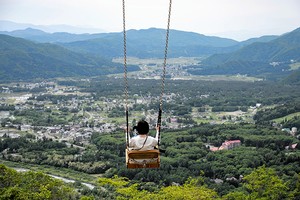By SHIKI IWASAWA/ Staff Writer
December 4, 2024 at 16:38 JST
 Kazutaka Sakamoto heads the content acquisition department of Netflix in Japan. (Provided by Netflix)
Kazutaka Sakamoto heads the content acquisition department of Netflix in Japan. (Provided by Netflix)
Netflix Japan, which recently surpassed 10 million domestic subscribers, intends to continue developing made-in-Japan programs, including original anime, the head of content acquisition said.
“Our priority is producing works that have an impact here,” Kazutaka Sakamoto told media representatives.
Netflix began its internet streaming service in Japan in 2015 and reached 5 million subscribers within five years. That figure has doubled over the past four years.
The recent increase in membership has been attributed to the popularity of domestically produced programs. Sakamoto said continuing that policy will provide “viewers the opportunity for appealing and fresh new encounters.”
Netflix has been using the studios of major companies, such as Toho Co. and TV network TBS Holdings Inc., to produce its domestic content, and Sakamoto said further efforts would be made to expand this practice.
Sakamoto also addressed the concerns raised about harsh working conditions at movie and TV production companies.
He said that, ideally, daily production time would be limited to 12 hours, and everyone would have one day a week off from filming.
Globally, Netflix had about 280 million subscribers as of the end of September. According to Gem Partners, an entertainment research company, Netflix had the top market share of video streaming services in Japan, at 21.7 percent in 2023.
Excerpts of the interview with Sakamoto follow:
Question: What are the issues facing your company nine years after entering the Japanese market?
Sakamoto: Our main issue is how to improve the variety and quality of our programming.
In particular, we have made it our mission to discover stories that have not yet been told, and we discuss this every day.
Q: Will an increase in subscribers lead to an increase in the funds that can go into producing new works?
A: We have emphasized creating a production environment that is safe and sound for the workers. But because the production budget varies greatly on each work, it is difficult to say in general (that the budget for a show will increase).
Q: How many more subscribers do you want to have in the future?
A: We have not set any specific goals. Streaming services are still in an early stage, and we believe this is still a relatively new habit. We feel it’s most important to first have many people try out the service and enjoy it, so that it becomes an indispensable part of life in Japan. That is where we are placing the most emphasis.
Q: You said that the time spent watching Netflix is still less than time spent watching TV. What do you consider the ideal situation?
A: We feel that streaming services in general will become more a part of daily life in the future, which means there is a lot of room for growth. That is what we want to expand.
Q: What are your plans for Japanese anime, which is a popular genre globally?
A: About half of all 283 million Netflix members worldwide have viewed anime at least once, so that is a market with huge potential. We consider anime to be our most important asset.
Anime adaptations are often supported by the fanbase of the original manga they are based on. However, we are also considering approaches that only we can do, by trying to find those stories that have never been told before.
Q: Does that mean you will put greater effort into producing original anime works?
A: Yes. There are many possible genres and different formats, such as a two-hour movie format or a series format of (shorter episodes). We want to choose stories that match each format and find appealing stories and unique approaches, such as spinoffs utilizing interesting characters.
Q: When you entered the Japanese market in 2015, there was only a weak awareness among consumers of paying for content. Has that awareness changed?
A: Japan is undoubtedly a special market within the world in terms of content being available for free. But we feel that our progress has been proportional to the trust we have gradually built among viewers.
We feel it is important to continue to carefully face those viewers and provide them with programs they will be satisfied with.




















A peek through the music industry’s curtain at the producers who harnessed social media to help their idols go global.
A series based on diplomatic documents declassified by Japan’s Foreign Ministry
Here is a collection of first-hand accounts by “hibakusha” atomic bomb survivors.
Cooking experts, chefs and others involved in the field of food introduce their special recipes intertwined with their paths in life.
A series about Japanese-Americans and their memories of World War II